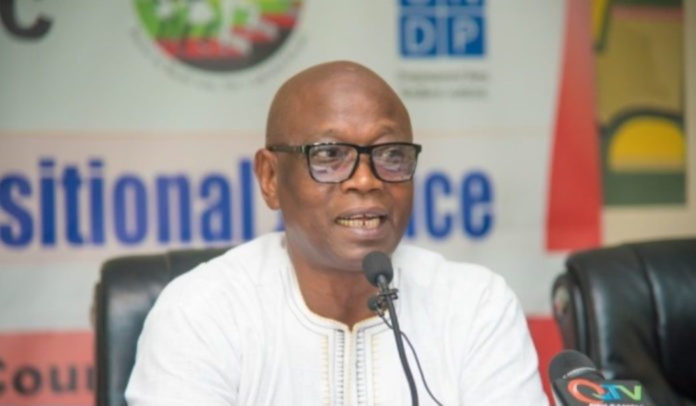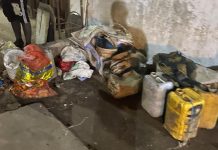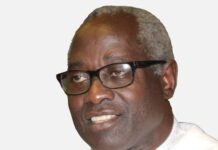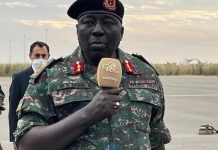By Baba Galleh Jallow
Monday, October 15 saw the long anticipated launching of the TRRC. The ceremony at Dunes Resort was attended by President Barrow, cabinet ministers, Gambia Government, civilian and security officials, senior UN Officials, members of the Diplomatic Corps, victims’ representatives, TRRC Staff and Commissioners, and a cross section of the Gambian public. Newly appointed TRRC Chair Dr. Lamin Sise flew in from New York to attend the ceremony. All eleven Commissioners were sworn-in, making their appointments official. Over the next few days, the TRRC Secretariat and Lead Counsel will meet with the Commissioners to update them on what has been done so far and assess our level of preparedness to begin hearings.
The launching was preceded by a series of institutional set up and training activities designed to render both commissioners and secretariat staff ready for the challenging task ahead. From Monday, September 10 to Friday, September 14 the commissioners underwent a rigorous training program on managing a truth commission process. The training, facilitated by a combination of transitional justice experts from the International Center for Transitional Justice (ICTJ), the UNDP Gambia Transitional Justice Program, and the TRRC Secretariat updated the commissioners on the outreach work we have done so far, familiarized them with key aspects of the TRRC Act, and engaged them in a conversation on issues such as reconciliation, reparations, amnesty, thinking through the tensions and priorities in truth commission processes, typical phases of a truth commission process, information flow and management, inclusivity and the victim-centered approach, research and investigations of human rights violations, operationalizing justice in a truth commission process, child and gender considerations, and ensuring Never Again through institutional reforms, building trust and genuine inclusivity, among others. The commissioners also had a chance to meet separately with the TRRC Secretariat and the Ministry of Justice to have some of their initial questions answered.
The commissioner training was followed on Sunday, September 16 by a rigorous one-day training workshop for our newly recruited staff at the National Nutrition Agency (NaNA) conference hall. The workshop was attended by our teams of investigators, researchers, statement takers and reconciliation officers as well as newly recruited members of our management team.
On Wednesday, September 19 the TRRC held its first women’s listening circle at the offices of the Alliance Francaise. The first of many planned for the near future, the women’s listening circle provided a safe space for female victims of political and gender-based violence to pour their hearts out to their fellow women, to express their opinions on the TRRC process, and to highlight their needs and expectations of the TRRC process. Other women’s listening circles will be held across the country in the coming weeks and months.
On Saturday, September 22 the TRRC hosted its first townhall meeting at Father Farrell Memorial Hall, Westfield. The townhall was attended by over 200 members of the public and saw impassioned speeches by victims from various walks of life. It also received a lot of international attention and was covered by the BBC and other international media outlets. TRRC Deputy Chairperson Mrs. Adelaide Sosseh, Youth Commissioner Mustapha Kah, Commissioners Imam Ousainou Jallow and Mr. Lang Kinteh, and senior secretariat staff were at hand to answer questions and engage the public in very fruitful conversations. Similar townhalls are planned for the rest of the country in the coming weeks and months.
This first townhall was followed by five days of rigorous training for staff on various aspects of the TRRC mandate and truth commission processes generally. An October 8 – 10 training workshop sponsored by International IDEA and the TRRC was facilitated by Chief Firmin Azitariga, a well-known Ghanaian expert on truth commission research and investigations. Topics covered included concepts, mandates and legal frameworks of investigations into past human rights abuses, investigative strategies for truth commissions, interviewing techniques and statement taking, search procedures and techniques, crime scene management, intelligence management, forensic investigations by truth commissions, and investigations of sexual and gender-based violence. These three days of intensive training were followed by two days of staff training on October 12 and 13 facilitated by the Gambian TRRC management team. Topics covered during this all-Gambian training included understanding the TRRC Mandate and the TRRC Act, terms of reference for statement takers, review of the draft statement taking form, review of the research and investigations plan, the peace model and cognitive interview techniques, investigative report writing, team values and ethics and leadership theory and practice.
We are happy to report that the TRRC Secretariat is almost fully set up at this time. Among the structures we have in place are a women’s affairs coordination unit to help mainstream women’s concerns and direct engagement in the TRRC process, a victim support coordination unit to ensure that victims’ concerns are given all the care and attention they deserve, and a youth and children’s network coordination unit to ensure that children and youths remain at the center of our national conversation on how best to ensure that Never Again shall we have dictatorship and gross human rights violations in this country. We are happy to report that over 99 percent of our staff are young people. We have deliberately tapped into the rich fund of young Gambian talent to work as staff and to oversee the youth and children’s network coordination unit. Under the supervision of Youth Commissioner Mustapha Kah and Bubacarr Sambou, our YCNC unit includes child rights activists and poets Mariama Cham, Lala Touray, Omar Champion Cham and Cherno Gaye. They have already met with some victims of the April 10 and 11, 2000 student massacre and will be visiting and talking to students at several Banjul and KM schools within the next week. The TRRC will continue to reach out to and engage children and young people in schools and communities across the country through this unit. In this regard, we anticipate close collaboration with the National Youth Council and other youth organizations across the country.
Our Communications, Outreach and Media Unit oversees the work of a team of seven reconciliation officers, two communications officers, and a community outreach coordinator who facilitates and promotes our direct connection and conversation with the Gambian public. Through this unit we inform the public of our work and engage our communities in dialogue. Community dialogue takes the form of face to face meetings with civil society organizations, media engagements, townhalls, women’s listening circles, village dialogues, and engagements with local communities. Planned to enhance popular empowerment and a healthy community spirit, these activities are planned to take place across the country on a continuous basis for the duration of the TRRC process.
We also have a fully-fledged Research and Investigations Unit that oversees the work of nine investigators, five research assistants and as of now, seventeen statement takers. This unit has since started talking to potential witnesses for our first hearings and is working hard to secure a database to enable proper storage of witness information and statements to be taken from Victims. As soon as this is in place, wider calls for witnesses to come forward and have their statements taken will be issued. Our research and investigation process starts from July 22nd 1994 and will proceed on a year by year basis to January 2017. Depending on the overall strategy recommended, approved and adopted by the Lead Counsel and Research and Investigations Unit, hearings on some cases and issues may not follow this chronological order. In general, investigations will be conducted and hearings held at both the individual witness level and around major events that occurred between July 1994 and January 2017. For instance, there will be hearings on individual cases of torture, murder, enforced disappearances and other violations as well as hearings on major events like the July 22nd coup, the November 11, 1994 incident, and the April 10 and 11, 2000 student massacre, among others. Also planned are other thematic hearings, institutional hearings and hearings surrounding the former president’s aids treatment program among other issues.
While we are certainly ready to function as a fully-fledged institution, our level of preparedness to hold hearings remains inadequate at this point. We anticipate that renovation works on our offices at Dunes Resort will be finished by the end of this month. However, the premises will need to be furnished and our IT system installed and tested before any hearings can be held. And so while we are happy to report that we are institutionally ready to hold hearings, there are some key logistical requirements that must be fulfilled before we can hear that first historic testimony on the occurrences and circumstances surrounding the July 22nd, 1994 coup. Hopefully we will soon have a date for that. Meanwhile, please watch out for TRRC billboards currently coming up in the Greater Banjul Area and all across the country.
#Never Again.
Note: The author is the Executive Secretary of the Truth, Reconciliation and Reparations Commission of The Gambia.





















